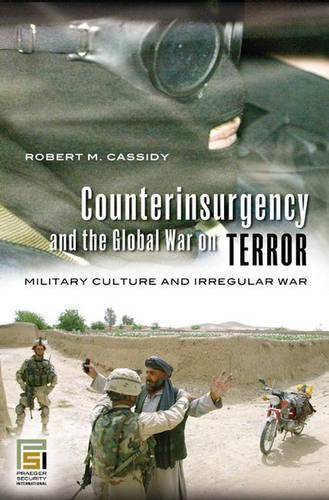
Counterinsurgency and the Global War on Terror: Military Culture and Irregular War
(Hardback)
Publishing Details
Counterinsurgency and the Global War on Terror: Military Culture and Irregular War
By (Author) Robert M. Cassidy
Bloomsbury Publishing PLC
Praeger Publishers Inc
30th April 2006
United States
Classifications
General
Non Fiction
355.02
Physical Properties
Hardback
224
Description
Since September 2001, the United States has waged what the government initially called the global war on terrorism (GWOT). Beginning in late 2005 and early 2006, the term Long War began to appear in U.S. security documents such as the National Security Council's National Strategy for Victory in Iraq and in statements by the U.S. Secretary of Defense and the Chairman of the JCS. The description Long Warunlimited in time and space and continuing for decadesis closer to reality and more useful than GWOT. Colonel Robert Cassidy argues that this protracted struggle is more correctly viewed as a global insurgency and counterinsurgency. Al Qaeda and its affiliates, he maintains, comprise a novel and evolving form of networked insurgents who operate globally, harnessing the advantages of globalization and the information age. They employ terrorism as a tactic, subsuming terror within their overarching aim of undermining the Western-dominated system of states. Placing the war against al Qaeda and its allied groups and organizations in the context of a global insurgency has vital implications for doctrine, interagency coordination, and military cultural change-all reviewed in this important work. Cassidy combines the foremost maxims of the most prominent Western philosopher of war and the most renowned Eastern philosopher of war to arrive at a threefold theme: know the enemy, know yourself, and know what kind of war you are embarking upon. To help readers arrive at that understanding, he first offers a distilled analysis of al Qaeda and its associated networks, with a particular focus on ideology and culture. In subsequent chapters, he elucidates the challenges big powers face when they prosecute counterinsurgencies, using historical examples from Russian, American, British, and French counterinsurgent wars before 2001. The book concludes with recommendations for the integration and command and control of indigenous forces and other agencies.
Reviews
Counterinsurgency is a timely submission that addresses the effects of globalization and modernity upon the conduct of insurgency and counter-insurgency. . . . [T]he reader can use this work as a point of departure to continue the discussion among his or her professional compatriots rather than as a definitive guidebook. . . . [T]his work should be in the library of any serious student of counter-insurgency or of military culture and its effect on the conduct of operations. * Royal United Services Institute Journal *
In a very timely, interesting, and thought-provoking book, Robert Cassidy argues for re-conceptualizing what was first called the global war on terrorism: then the global struggle against violent extremism, and currently, the long war. He argues that the prolonged struggle against al Qaeda and its affiliates should be seen as a global counterinsurgency, which requires an appropriate strategy, integrating national and international resources and agencies. Conceptualizing the long war as a global counterinsurgency requires also rethinking military culture, doctrine, and interagency coordination, and Cassidy's book does just that. . . . [a] useful and important addition to the scholarship on counterinsurgency. * Political Science Quarterly *
Counterinsurgency and the Global War on Terror takes the Army to task for forsaking the lessons of its own history. . . . [A]n impressive exploration of why we were years into the war in Iraq before we published a field manual on counterinsurgency and are only now attempting to find a coherent approach to a complex world war. His idea of turning insurgents against themselves offers an insightful solution to what appears to be an intractable problem. . . . Cassidy and his fellow military intellectuals need to conduct their debate from the inside, in public, so that the mistakes and successes of the past receive the kind of thoughtful examination they are due. * ARMY *
This story has been told before, but Cassidy's account is richer than most and benefits from the evident exasperation of a U.S. Special Forces officer trying to cope with a conflict for which his country seems so unready. To demonstrate that Western countries need not be paralyzed by their military cultures, he finds evidence in past practice, including the Indian wars and the Philippines, that it is possible to deal with insurgents in a politically astute manner. The requirements are minimal but include credible force, close cooperation between civil and military agencies, indigenous forces employed where possible, and legitimate political processes, even when this means drawing in opposition elements. * Foreign Affairs *
Cassidy views the global war on terror conducted by the United States since 2001 as a new kind of insurgency and counterinsurgency that has evolved within the context of globalization. His analysis of this new global networked insurgency and counterinsurgency operates on the principles of know thy enemy, know yourself, and know the kind of war you are embarking on, thus presenting chapters analyzing the culture, ideology, and tactics of al-Qaeda and affiliated groups; the capacity or propensity of the Russian, American, and British military cultures for counterinsurgency; and historical lessons from American, British, and French experiences with counterinsurgency. * Reference & Research Book News *
Author Bio
Robert M. Cassidy has served in leadership and staff positions in the 4th Infantry Division, the 8th Infantry Division, the 82nd Airborne Division, the Third Army, and the Seventh Army. He is a graduate of the French Joint Defense College and he has a PhD in International Security Studies from the Fletcher School of Law and Diplomacy. He is the author of Peacekeeping in the Abyss: British and American Peacekeeping Doctrine and Practice After the Cold War (Praeger, 2004) and he has published articles in Parameters, Military Review, Small Wars and Insugencies and The Fletcher Forum.
